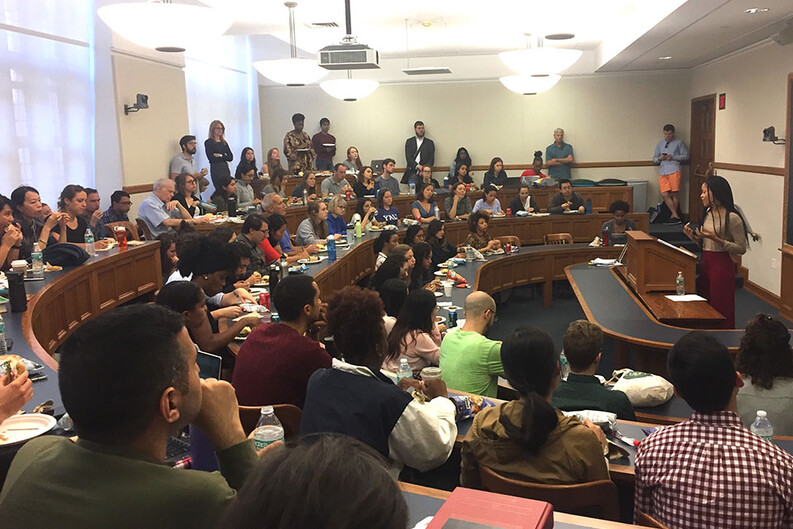Solomon Center Hosts Khiara Bridges on White Privilege and Reproductive Rights

Khiara Bridges4, Professor of Law and Associate Dean for Equity, Justice, and Engagement at Boston University School of Law, presented a lunch talk on September 20 at Yale Law School hosted by the Solomon Center for Health Law and Policy5, the Yale Health Law and Policy Society6, and the Yale Black Law Students Association7. Professor Bridges addressed a packed lecture hall of students from across the university, speaking about white privilege and white disadvantage, the topic of a forthcoming paper.
Bridges asked the audience to think critically about the often-used phrase “poor people and people of color” and the way the phrase implies that poor white people and people of color are similarly situated in American society. “If poor white people are like people of color, then the term white privilege is misleading since the concept presupposes that all white people, even poor white people, have advantages on account of their race.” Bridges argued that white privilege is still a useful concept and explained that in order to be most effective in understanding how white privilege operates, we need to identify the specific benefits that the most disadvantaged, disempowered white people enjoy on account of their race.
To illustrate how white privilege affects poor white people, Bridges used the story of Carrie Buck, the subject of the 1927 Supreme Court case Buck v. Bell, which held that the Constitution did not contain a fundamental right to be free from forced sterilization. Bridges argued that Carrie Buck’s whiteness was the very thing that made her vulnerable to the eugenics movement of the early 20th century, as the movement, which sought to “protect the white race from degeneration,” focused primarily on white people. This was in contrast to the forced sterilization of women of color that occurred during the 1960s and 1970s. Bridges argued that as a result of the civil rights movement, non-white people were able to make claims on the state and this made them vulnerable to forced sterilization.
When identifying to the specific advantages Carrie Buck received due to her whiteness, Bridges pointed to the fact that she was able to live in an institution for those with intellectual disabilities. During the early 20th century, these institutions were, for the most part, only open to white people. However, this advantage also made those living in these institutions more visible to the State, increasing the vulnerability of women like Carrie Buck. Bridges argued, “Buck’s racial privilege opened the door for the state to care for her, and, of course, on the other side of the door Buck found state-sanctioned violence.”
Following the lecture, Bridges addressed audience questions regarding how her argument applies to contemporary politics and reports of the anger of disadvantaged white voters. According to Bridges, whiteness is a double-edged sword, and exploring the way in which privilege can subordinate those who we typically think of benefitting from it can hopefully be a step toward making white people understand that dismantling white privilege is also to their benefit: “White privilege is a dangerous thing both for those who don’t have it and those who possess it. [Which is] another reason we should all work to dismantle it.”


